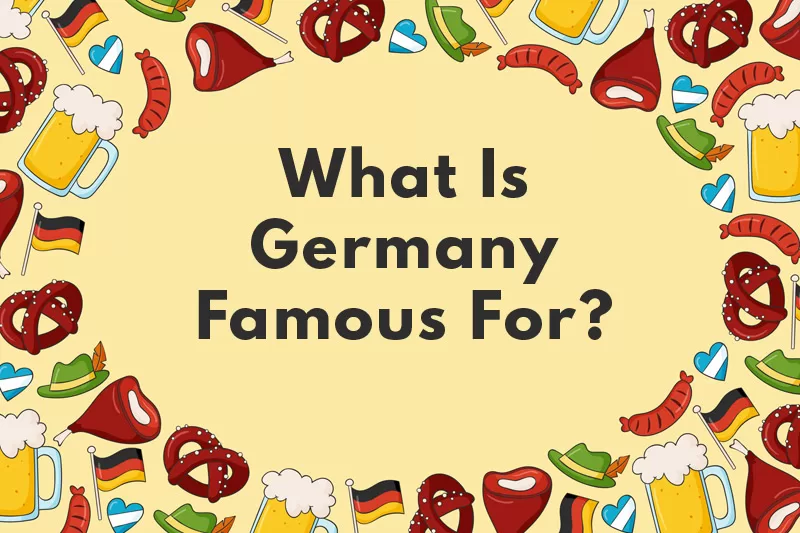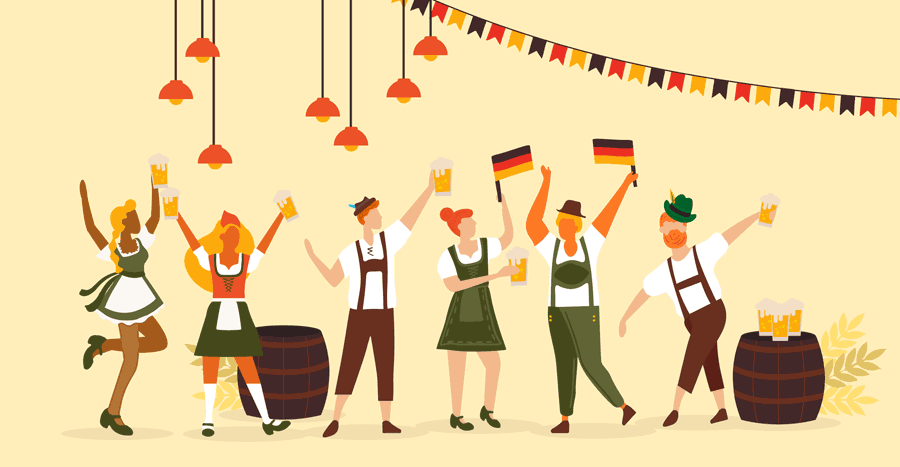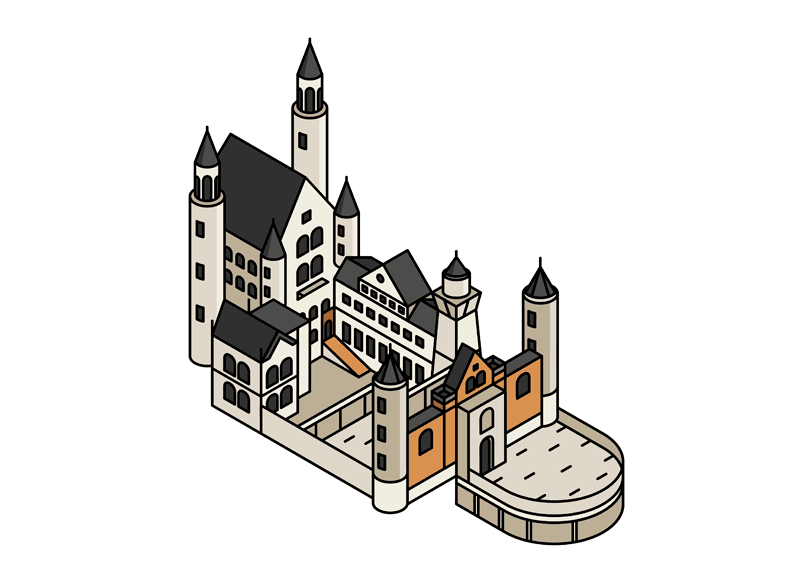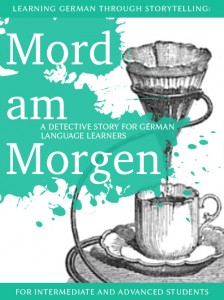
Germany is a country rich in history, culture, and innovation. From its stunning landscapes to its bustling cities and world-renowned industries, there’s something for everyone in Germany!
From its contributions to art, music, and literature to its reputation for innovation and engineering, Germany is known for many things that have made it one of the most influential countries in Europe and beyond
In this article we’ll explore some of the things that have made Germany famous across the globe, from its cultural heritage to its technological advancements and beyond.
🧾 1. Literature & Philosophy
Germany is famous for its literature and philosophy due to its rich intellectual history and the numerous influential thinkers and writers who have emerged from the country. Throughout the centuries, German authors, poets, and philosophers have made significant contributions to global thought and culture, shaping the way we understand and view the world.
The first printed book was created in Germany by Johannes Gutenberg in the mid-15th century. The Gutenberg Bible, which was printed in 1455, revolutionized the way information was disseminated, making it easier and more affordable to produce books in large quantities. This innovation played a significant role in the development of modern mass communication.
Literature
German literature boasts a long and varied history, with works spanning from the Middle Ages to the modern era. Some of the most renowned German authors and their influential works include:
- Johann Wolfgang von Goethe: Often regarded as Germany’s most prominent literary figure, Goethe’s works such as “Faust” and “The Sorrows of Young Werther” have had a lasting impact on literature and inspired generations of writers and thinkers.
- Franz Kafka: A seminal figure in 20th-century literature, Kafka’s works, including “The Metamorphosis” and “The Trial,” have influenced numerous authors and are considered masterpieces of existentialist fiction.
- Thomas Mann: A Nobel Prize-winning author, Mann’s works like “Buddenbrooks” and “The Magic Mountain” are renowned for their depth, complexity, and exploration of the human psyche.
Philosophy
Germany has a storied tradition of philosophical thought, with many German philosophers shaping the course of Western philosophy. Some of the most famous German philosophers and their contributions include:
- Immanuel Kant: A key figure in the Enlightenment, Kant’s works such as “Critique of Pure Reason” and “Critique of Practical Reason” have had a profound impact on metaphysics, epistemology, and ethics. His philosophy emphasized the importance of reason, autonomy, and moral duty.
- Friedrich Nietzsche: Known for his provocative and often controversial ideas, Nietzsche’s works, including “Thus Spoke Zarathustra” and “Beyond Good and Evil,” challenged traditional morality and questioned the foundations of Christian ethics. His concept of the “Übermensch” and his critique of nihilism continue to influence contemporary philosophy.
- Georg Wilhelm Friedrich Hegel: A central figure in German Idealism, Hegel’s works, such as “Phenomenology of Spirit” and “Elements of the Philosophy of Right,” have shaped modern philosophical thought, particularly in the areas of metaphysics, logic, and political theory. His dialectical method and the concept of the “Absolute” have had a lasting influence on various fields of study.
“A fellow student asks a student who came late from a Schelling lecture: ‘Did Magister Darkhat go over time again?’ – ‘Yes, he spoke for more than two hours.’ – ‘And what did he talk about?’ – ‘He didn’t say.'” – from: Geh mir aus der Sonne!: Anekdoten über Philosophen und andere Denker, by Peter Köhler
🍺 2. Food and Drink

Germany is famous for its delicious cuisine, which has gained popularity all over the world. Some of the most popular German dishes include schnitzel, sausages, and sauerkraut. Germans are also known for their love of beer, and the country is home to some of the world’s most famous breweries.
Germany’s famous Oktoberfest in Munich is a testament to the country’s love for beer and food, and the festival attracts visitors from all over the world every year. Other popular German drinks include Riesling wine and schnapps, a type of distilled spirit. Last but not least, there are many world-famous German cakes.
Germany is famous for its beer, and for good reason. German beer is known for its high quality and purity standards, which are regulated by the German Beer Purity Law, or Reinheitsgebot. This law, which was introduced in 1516, stipulates that beer can only be made with four ingredients: water, barley, hops, and yeast. Today, there are over 1,300 breweries in Germany, producing more than 5,000 different types of beer.
🎭 3. Music & Art
Germany is also known for its music and art due to the country’s rich cultural history, which has produced numerous influential composers, musicians, painters, and other artists. Their works have made a significant impact on the global arts scene, shaping the development of various genres and styles.
Music
Germany has a long and distinguished musical heritage, with contributions spanning various periods and styles. Some of the most famous German composers and musicians include:
- Johann Sebastian Bach: A master of the Baroque period, Bach’s intricate and expressive compositions, such as the “Brandenburg Concertos” and “St. Matthew Passion,” have had a lasting impact on the music world, influencing countless composers that followed.
- Ludwig van Beethoven: Regarded as one of the greatest composers of all time, Beethoven’s works, including his nine symphonies, the “Moonlight Sonata,” and “Fidelio,” pushed the boundaries of classical music, bridging the gap between the Classical and Romantic periods.
- Richard Wagner: A key figure in the development of opera, Wagner’s innovative works, such as “The Ring Cycle” and “Tristan und Isolde,” revolutionized the genre with their dramatic narratives, rich harmonies, and the concept of “Gesamtkunstwerk” – a synthesis of various art forms.
In addition to classical music, Germany has also been influential in contemporary music, producing notable bands and musicians across various genres, such as Kraftwerk (electronic), Rammstein (rock/metal), and Scorpions (hard rock).
“Music is a higher revelation than all wisdom and philosophy. Music is the electrical soil in which the spirit lives, thinks and invents.” – Ludwig van Beethoven
Art
Germany’s artistic heritage encompasses various styles and movements, with German painters, sculptors, and other artists making significant contributions to the world of art. Some notable aspects of German art include:
- Renaissance and Baroque: Artists like Albrecht Dürer and Matthias Grünewald were pivotal figures in the Northern Renaissance, while Johann Baptist Zimmermann and Balthasar Neumann made their mark on the Baroque period, producing ornate and intricate works that reflected the era’s aesthetics.
- Romanticism: Caspar David Friedrich, one of the most important painters of the Romantic movement, created evocative landscapes that captured the essence of the sublime and the relationship between humans and nature.
- German Expressionism: This early 20th-century art movement saw artists like Ernst Ludwig Kirchner, Franz Marc, and Wassily Kandinsky create bold, emotive works that sought to express deeper emotional and psychological states.
- Bauhaus: Founded by Walter Gropius, the Bauhaus school of art, design, and architecture revolutionized the way we think about design, influencing various artistic disciplines and inspiring the development of modernist and minimalist aesthetics.
“Our guiding principle was that design is neither an intellectual nor a material affair, but simply an integral part of the stuff of life, necessary for everyone in a civilized society.” – Walter Gropius
👄 4. German Language
The German language is famous for several reasons, including its historical significance, linguistic features, and the cultural and intellectual contributions made by German-speaking people. Here are some aspects that make the German language stand out:
- Pronunciation and grammar: German is known for its distinctive pronunciation, including its use of the guttural ‘r’ sound and the unique ‘ch’ sound. The language also features grammatical cases (nominative, accusative, dative, and genitive), which may seem complex to learners but are essential for conveying meaning and understanding.
- Compound words: One of the most distinctive features of the German language is its ability to create long compound words by combining multiple words into one. This characteristic allows for the precise expression of complex ideas and concepts. For example, “Donaudampfschifffahrtsgesellschaftskapitän” is a compound word that refers to the captain of a steamboat company operating on the Danube River.
- Grammatical structure: The German language is known for its complex grammatical structure, which includes three grammatical genders (masculine, feminine, and neuter), four cases (nominative, accusative, dative, and genitive), and a relatively flexible word order. While this complexity can be challenging for learners, it also allows for a high degree of precision and nuance in expression.
- Linguistic influence: The German language has influenced other languages, particularly in the realm of vocabulary. Several German words have been borrowed by English and other languages, such as “kindergarten,” “doppelgänger,” “gesundheit,” and “schadenfreude.”
- Widely spoken in Europe: German is the most widely spoken native language in the European Union, with approximately 100 million native speakers. It is an official language in Germany, Austria, Switzerland, Liechtenstein, Luxembourg, and Belgium, and it is also spoken by minority communities in other countries.
- Influential literature and philosophy: As previously mentioned, German-speaking authors, poets, and philosophers have made substantial contributions to global thought and culture. Renowned figures such as Goethe, Schiller, Kafka, Nietzsche, and Kant have shaped the way we understand and view the world, and their works continue to be studied and appreciated today.
- Influential scientific and technical vocabulary: German has been an important language in the fields of science, technology, and engineering. Many significant scientific discoveries and inventions were made by German-speaking researchers, and German continues to be an important language in academia and research. As a result, a vast array of scientific and technical terms have their roots in the German language.
“I can understand German as well as the maniac that invented it, but I talk it best through an interpreter.” – Mark Twain
🔬 5. Technology and Industry
Germany is well known for its technology and industry, which have played a crucial role in shaping the country’s economy and global reputation. Scientists such as Albert Einstein and Max Planck were born in Germany and made significant contributions to the fields of physics and mathematics.
The country’s dedication to scientific research has also made it a leader in fields such as biotechnology, aerospace, and renewable energy. The nation’s focus on innovation, engineering, and manufacturing has made it a leader in several sectors, both historically and in the present day. Here are some reasons why Germany is renowned for its technology and industry:
- Automotive industry: Germany is home to some of the world’s most prestigious car manufacturers, such as BMW, Mercedes-Benz, Audi, and Volkswagen. These companies are known for their cutting-edge technology, engineering excellence, and high-quality products. The German automotive industry is also at the forefront of electric vehicle development and autonomous driving technology.
- Engineering and machinery: German engineering is highly regarded worldwide for its precision, quality, and innovation. The country has a strong industrial base, specializing in the production of advanced machinery, tools, and equipment used in various sectors. Companies like Siemens, Bosch, and ThyssenKrupp are global leaders in their respective fields.
- Chemical and pharmaceutical industries: Germany has a robust chemical and pharmaceutical industry, with companies like BASF, Bayer, and Merck KGaA leading the way in the production of chemicals, pharmaceuticals, and other related products. These companies are known for their research and development capabilities and contributions to scientific advancements.
- Renewable energy: Germany is a leader in renewable energy technology, particularly in the fields of solar and wind power. The country has made significant investments in research, development, and infrastructure to support the transition to cleaner energy sources. As a result, Germany has become one of the world’s largest producers of renewable energy.
- Information and communication technology: The German information and communication technology sector has experienced significant growth in recent years, with companies like SAP, Deutsche Telekom, and Software AG making notable contributions to the field. Germany is also emerging as a hub for startups and innovation, particularly in cities like Berlin, Munich, and Hamburg.
- Industry 4.0: Germany is at the forefront of the Industry 4.0 movement, which focuses on the digitization of manufacturing and the integration of advanced technologies like artificial intelligence, the Internet of Things (IoT), and robotics into industrial processes. The country’s focus on technological innovation and its strong manufacturing base make it well-positioned to lead the way in the next industrial revolution.
A fun fact about the invention of the Diesel engine is that its creator, Rudolf Diesel, was actually trying to create an engine that would run on to run on coal dust, and then switched to . Diesel was a firm believer in the potential of renewable energy and hoped that his engine would help farmers and small businesses become more self-sufficient by allowing them to power their machinery with locally-produced vegetable oil. While diesel fuel eventually became the primary fuel used in Diesel’s engine, the inventor’s original vision of a sustainable and decentralized energy system continues to inspire renewable energy advocates to this day.
Other Notable German Inventions:
- Aspirin – Felix Hoffmann, a chemist working for the German pharmaceutical company Bayer, developed aspirin in the late 19th century, providing a safe and effective treatment for pain and inflammation.
- X-ray machine – Wilhelm Conrad Röntgen discovered X-rays in 1895, leading to the development of the X-ray machine and revolutionizing the field of medical imaging.
- Fanta – During World War II, the Coca-Cola Company’s German subsidiary was unable to import the syrup needed to make Coca-Cola, so they developed a new orange-flavored soft drink called Fanta, which became popular around the world.
- MP3 – The MP3 audio format was developed by a team of engineers at the Fraunhofer Institute in Germany in the late 1980s, and has since become a popular format for digital music.
- Jet engine – Hans von Ohain and Frank Whittle both independently developed the jet engine in the 1930s, paving the way for modern air travel and military aviation.
- Volkswagen Beetle – The iconic Volkswagen Beetle was designed by Ferdinand Porsche in the 1930s, and became one of the most popular and recognizable cars in history.
- Gummy bears – Gummy bears were invented by Hans Riegel, the founder of the German candy company Haribo, in the 1920s.
💸 6. Economy
Germany is considered an economic powerhouse due to a combination of factors that have contributed to its strong and stable economy. These factors include its robust industrial base, skilled workforce, focus on innovation, export-oriented economy, and political stability. Here’s a closer look at the reasons behind Germany’s economic success:
- Industrial strength: Germany has a long history of industrial prowess, particularly in sectors such as automotive, engineering, and machinery. German companies like BMW, Mercedes-Benz, Siemens, and Bosch are world-renowned for their high-quality products and technological innovations.
- Skilled workforce: Germany’s well-educated and highly skilled workforce is a significant contributor to its economic success. The country’s vocational education system, known as the “dual system,” combines classroom learning with on-the-job training, equipping students with the skills required to excel in their chosen fields.
- Innovation: Germany consistently ranks among the top countries for innovation, thanks to its strong research and development infrastructure. The country’s focus on technological advancements and commitment to funding R&D projects, particularly in areas such as renewable energy, nanotechnology, and biotechnology, helps drive economic growth and maintain its competitive edge.
- Export-oriented economy: Germany is one of the world’s leading exporters, with its high-quality products and services in high demand globally. The country’s export-driven economy benefits from its central location in Europe, well-developed infrastructure, and strong trade relationships with other countries.
- Political stability: Germany’s political stability, with its effective governance and commitment to economic reforms, has helped create a favorable business environment. This stability attracts foreign investment and fosters economic growth.
- Strong focus on small and medium-sized enterprises (SMEs): The German economy is characterized by a large number of SMEs, often referred to as the “Mittelstand.” These companies form the backbone of the economy, providing employment, driving innovation, and contributing to exports.
- Fiscal responsibility: Germany has a reputation for fiscal discipline, with balanced budgets and low public debt levels compared to other major economies. This prudent approach to public finances has helped maintain the country’s economic stability and resilience during global economic downturns.
“You can override many things, but not gravity, not the speed of light.” – Angela Merkel
🏛 8. Architecture

Germany is world-renowned for its historical architecture, which showcases the country’s rich and diverse cultural heritage. This architectural legacy spans several centuries, reflecting various architectural styles and movements. Some of the most well-known historical structures in Germany include:
- Cologne Cathedral: This iconic Gothic cathedral, located in Cologne, is one of the most visited landmarks in Germany. With its impressive twin spires and intricate stone carvings, it is a prime example of Gothic architecture. The cathedral also houses the Shrine of the Three Kings, making it an important site for Christian pilgrimage.
- Brandenburg Gate: Situated in Berlin, the Brandenburg Gate is a symbol of German unity and history. Built in the 18th century in the neoclassical style, it was inspired by the Propylaea of the Acropolis in Athens. The gate’s Quadriga sculpture, depicting the goddess of victory, adds to its visual appeal.
- Neuschwanstein Castle: This fairy-tale castle, located in Bavaria, was commissioned by King Ludwig II in the 19th century. Designed in the Romanesque Revival style, it served as an inspiration for Walt Disney’s Sleeping Beauty Castle. The picturesque setting and stunning architecture make Neuschwanstein Castle one of Germany’s most popular tourist attractions.
- Heidelberg Castle: This Renaissance-era castle, situated above the city of Heidelberg, is a mix of styles due to its construction and restoration over several centuries. The castle’s ruins, gardens, and impressive views of the city and the Neckar River make it a must-see destination.
- Charlottenburg Palace: Located in Berlin, Charlottenburg Palace is the largest and most opulent palace in the city. Built in the late 17th century and expanded in the 18th century, the palace displays Baroque and Rococo styles. Its beautiful gardens and richly decorated interiors attract visitors from around the world.
- Wartburg Castle: A UNESCO World Heritage site, Wartburg Castle is perched on a hill overlooking the town of Eisenach. Built in the Romanesque style, it played a crucial role in German history, as it was where Martin Luther translated the New Testament into German, helping to spread the ideas of the Protestant Reformation.
- Aachen Cathedral: One of the oldest cathedrals in Europe, Aachen Cathedral was built by Charlemagne in the late 8th century. The Palatine Chapel, with its distinct octagonal shape and Carolingian architectural style, is the centerpiece of the cathedral. Aachen Cathedral was also the site of the coronation of German kings for over 600 years.
⚽ 9. Sports

Germany’s passion for football is well-known across the globe. The country’s national football team has won several major international tournaments, including the FIFA World Cup and the UEFA European Championship. Football is an integral part of German culture, and the country is home to some of the world’s most famous football clubs, including Bayern Munich, Borussia Dortmund, and Schalke 04.
In addition to football, Germany excels in a variety of other sports, such as tennis, Formula One racing, and winter sports like skiing and biathlon. Famous German athletes include tennis legend Steffi Graf, Formula One champion Michael Schumacher, and Olympic gold medalist skier Maria Höfl-Riesch.
Germany has won the FIFA World Cup four times. They won their first World Cup in 1954, and then went on to win the tournament again in 1974, 1990, and 2014. They have also finished as runners-up four times, in 1966, 1982, 1986, and 2002. Overall, Germany is one of the most successful nations in World Cup history, having reached the semifinals 13 times and the quarterfinals 4 times in addition to their four victories.
👗 10. Fashion
While Germany may not be as internationally renowned for its fashion as countries like France or Italy, it has made significant contributions to the industry and has a growing reputation in certain areas of fashion. Here are some reasons why Germany is gaining recognition in the world of fashion:
- Berlin Fashion Week: Berlin Fashion Week is a biannual event that showcases both established and emerging designers from Germany and around the world. The event has gained prominence over the years and is increasingly becoming an important platform for innovative and sustainable fashion.
- German designers and brands: Germany has produced several influential fashion designers and brands that have made a name for themselves on the international stage. Some well-known examples include Hugo Boss, Adidas, Puma, Escada, and MCM. These brands are known for their quality, craftsmanship, and innovative designs.
- Streetwear and sportswear: Germany has a strong reputation in the streetwear and sportswear sectors, with brands like Adidas and Puma being global leaders in this area. The country’s focus on functionality, comfort, and practicality has made German sportswear and streetwear popular worldwide.
- Sustainable fashion: Germany is a leader in sustainable fashion, with numerous designers and brands focusing on environmentally friendly and ethical practices. The country’s emphasis on sustainability in fashion is evident in events like the Ethical Fashion Show Berlin and the Green Showroom, which showcase sustainable fashion innovations.
- Fashion schools and education: Germany is home to several well-regarded fashion schools, such as the Berlin University of the Arts, the Academy of Fashion and Design in Düsseldorf, and the AMD Academy of Fashion & Design in Munich. These institutions help nurture and develop the next generation of fashion designers and industry professionals.
“Sweatpants are a sign of defeat. You lost control of your life so you bought some sweatpants.” – Karl Lagerfeld
🏰 11. Travel and Tourism
Germany is a popular tourist destination, attracting millions of visitors each year. Some of the most famous attractions include the historic city of Heidelberg, the fairy tale-like Neuschwanstein Castle, and the bustling metropolis of Berlin.
Visitors to Germany can enjoy a variety of unique experiences, such as exploring the scenic Romantic Road, taking a boat tour along the Rhine River, or visiting its Christmas markets, which are a festive tradition that attracts visitors from all over the world. The markets offer a range of traditional German treats, such as gingerbread and mulled wine, and feature a range of artisanal crafts and holiday decorations.
Germany is home to numerous UNESCO World Heritage sites, including the historic city of Lübeck, the palaces and parks of Potsdam, and the Roman monuments in Trier. These sites offer visitors a glimpse into Germany’s rich cultural history and architectural heritage, from Gothic cathedrals to Baroque palaces. With so much to see and explore, Germany is a must-visit destination for travelers looking to experience Europe’s rich cultural and historical legacy.
Summary
Germany is a country with a rich cultural heritage and diverse economy. Its contributions to art, music, and philosophy, along with its reputation for engineering and technological advancements, have made it a leader in Europe and beyond.
Germany’s famous Oktoberfest, love for food and drink, dedication to science and medicine, and passion for sports and recreation are just a few of the things that make it a fascinating and exciting country to explore.
While Germany is famous for many things, it’s essential to remember that the country’s culture and history are complex and multifaceted. It’s also essential to note that Germany has faced its share of challenges, from World War II and the Holocaust to the country’s division during the Cold War.
Today, Germany is a vibrant and dynamic country that has overcome many obstacles and has emerged as a leader in many fields. Its dedication to innovation, education, and sustainability is a testament to its ongoing commitment to progress and positive change.
If you’re planning a trip to Germany, there are many things to see and do, from exploring the country’s historic landmarks and museums to trying its delicious food and drink. Whether you’re interested in art and culture, science and technology, or sports and recreation, Germany has something for everyone.
In conclusion, Germany is a fascinating and complex country that has overcome many challenges and has emerged as a leader in many fields. Whether you’re interested in exploring its historical sites, immersing yourself in the arts, or cheering on your favorite sports team, Germany has something to offer everyone.
FAQ
- What are some famous German landmarks? Some famous German landmarks include Neuschwanstein Castle, Cologne Cathedral, the Brandenburg Gate, and Heidelberg Castle.
- What is Germany’s national sport? Football (soccer) is considered Germany’s national sport and enjoys immense popularity among the population.
- What are some traditional German dishes? Traditional German dishes include bratwurst, sauerkraut, schnitzel, and pretzels.
- Which German city is famous for Oktoberfest? Munich is the city that hosts the famous Oktoberfest beer festival every year.
- Who are some famous German musicians and composers? Famous German musicians and composers include Ludwig van Beethoven, Johann Sebastian Bach, Richard Wagner, and contemporary bands like Rammstein and Scorpions.
–

